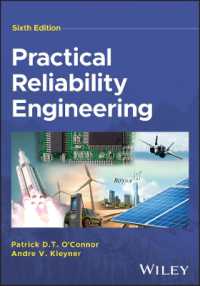Full Description
The Routledge International Handbook of Deindustrialization Studies is a timely volume that provides an overview of this interdisciplinary field that emerged in response to the widespread decline of manufacturing and heavy industry from the 1980s onward. Edited by prominent figures in the field, the volume brings together many of the leading scholars from a range of countries across the globe to offer a multifaceted overview of deindustrialization and its impact.
Deindustrialization has been cited as one of the factors behind the rise of the far right, and to a lesser extent the far left, across Europe, the rise and success of Trumpism in the US, and the Brexit vote as well as the more recent and sudden erosion of UK Labour's 'Red Wall' of the North of England. This collection brings together scholars of deindustrialization around the globe and from a wide variety of academic disciplines including history, sociology, politics, geography, economics, anthropology, literature, arts practice, photography, heritage, and cultural studies. In doing so, the volume explores the roots of deindustrialization across the world, highlights the key themes and issues in the field, illustrates the intersectional and interdisciplinary character of the field, and shows how deindustrialization lies at the heart of many of the key political, cultural, social, and economic issues of our time.
Written in a clear and accessible style, the Handbook is a comprehensive interdisciplinary volume for this young but maturing field. The volume is a valuable resource for students, teachers, and researchers interested in industrial decline, closure, and the multifaceted impacts they cause. It speaks to readers across the arts, humanities, and social and political sciences concerned with deindustrialization broadly defined.
Chapter 27 of this book is freely available as a downloadable Open Access PDF at http://www.taylorfrancis.com under a Creative Commons [Attribution-Non Commercial-No Derivatives (CC-BY-NC-ND)] 4.0 International license.
Contents
Introduction
Part I: Concepts and Theories
Introduction: Concepts and Theories
1. Theorizing Deindustrialization
2. Reflections on the Half-Life
3. Deindustrialization as Global History
4. Moral Economy and Industrial Culture
5. Racializing Deindustrialization Studies
Part II: Political Economy of Deindustrialization
Introduction: Political Economy of Deindustrialization
6. Uneven Development, the World System, and Lumpenization: Bringing Marxian Political Economy Back into Deindustrialization Studies
7. The Racial Dimensions of (De)industrialization
8. The Region as an Analytical Framework for Deindustrialization Studies: Regional Economic Development in Atlantic Canada
9. Deindustrialization and Nationhood
10. Challenging and Politicizing Deindustrialization?
11. Anticipating Just Transitions: Ecological Crisis and Future Deindustrialization
Part III: Communities, Identities, Affects
Introduction: Communities, Identities, Affects
12. Community, Affect and Deindustrialization
13. Deindustrialization and Racialized Communities: A Historical Perspective
14. Class, Gender, and Industrial Structures of Feeling after Socialism: Post-industrial Lives in the Post-Yugoslav Space
15. Metallic Vitalities: Smog, Steel and Stigma in a De-industrial Town
16. Deindustrialization, Leisure & Feeling Communities
17. "Dad, why did you bring me to a gay steel mill?" Notes Towards a Queer Study of Deindustrialization
Part IV: The Critical Cultural Work of Representations
Introduction: The Critical Cultural Work of Representations
18. Black Spatial Agency and Cultural Justice: Race, Ruins, and Gentrification in Detroit
19. Uncovering the Discovery of the Ruhr: Representations of Deindustrialization in Germany's Former Industrial Heartland
20. Making the Human Wreckage Visible: Deindustrialization in Kate Beaton's Ducks
21. The Sound of Deindustrialization
22. Garment Workers Through the Lens of Loss: The Long Shadow of Deindustrialization in South Asian Films
Part V: Memories, Memorialization, and the Heritage of Deindustrialization
Introduction: Memories, Memorialization, and the Heritage of Deindustrialization
23. Industrial Memory Landscapes in Urban Planning Processes - Comparative Perspectives from Germany, Luxembourg, and France
24. Memorialization of Industrial Pasts in Post-Socialist Countries
25. The Memorialization of Class in Industrial Heritage Initiatives
26. Uncovering Gender Tracks: Erasure and Railway Industrial Heritage Initiatives Across the World
27. Industrial Heritage from the South: Decolonial Approaches to the Social Construction of Heritage and Preservation Practices
Conclusion






